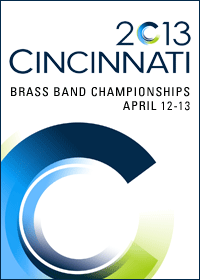2006 US Open Championships - Retrospective
9-Nov-2006The US Open had a real trans Atlantic feel to it this year, but it was those lads and lasses from Central Florida who will take the Jumbo to the UK next week with thier home country entertainment title tucked into their belts once more.
The US Open Brass Band Championships is an event many UK bandsmen would not immediately recognise, however it is one that is growing in stature every year and is certainly one whose international recognition will increase in the very near future. 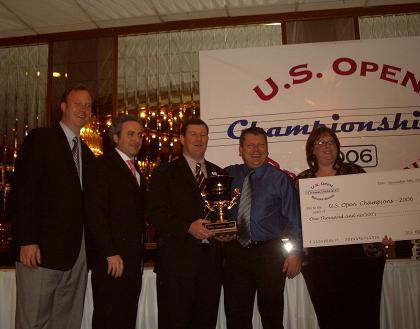
Winning smiles: Brass Band of Central Florida take the US Open title again
This year eight bands, seven from the US and one from England, took the stage in Arlington Heights to compete for the title of 2006 US Open Champions. What followed was an extremely interesting day, with at least three bands showing that they were more than capable of taking the overall title. Judges Alan Morrison, Curtis Metcalf and John Bell certainly had their work cut out for them as each band had something unique to offer. The pieces played on the day were a mixture of the old and new, with several great new arrangements that deserve their place in the established brass band repertoire.
Motor City Brass Band took the stage as first band on, resplendent in orange shirts and black ties – in concordance with their chosen theme of Halloween. Each piece in their programme was introduced by a witch costumed-lady, using a ghost story to link the pieces together. The stage had various props scattered around the front, including pumpkins and even a gravestone! Motor City's first piece was Denis Wright's ‘Tam O'Shanter's Ride'. 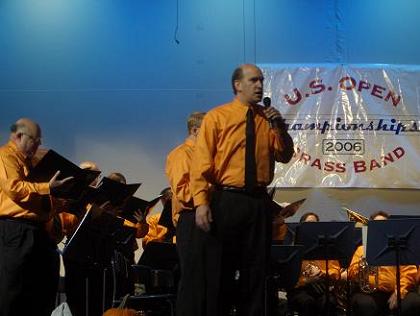
Pumpkin pie: Motor City go all halloweeny!
This generally came off, with some nice solo contributions and a solid bass foundation to the band, but the performance was marred slightly by a few too many insecurities in ensemble playing. Better ensemble playing was in evidence in many parts of the band's next item, ‘Battle of the Heroes', which began with some fine euphonium and horn sectional work.
The band's novelty item was ‘Grimm Grinnin' Ghosts'. Although not the most musically substantial piece, it nevertheless provided the audience with great entertainment, with singing and high jinks from many band members. Still keeping with the Halloween theme, an arrangement of Michael Jackson's ‘Thriller' was the next offering on show. Throughout this, the band's playing seemed to go up a notch in terms of rhythmic tightness and overall sound quality, the spoken part from the original song even being included for good measure.
Motor City saved their best playing until last, with ‘Ease On Down the Road' showing many of their strengths, which until that point had been rather hidden it must be said. The band obviously enjoyed playing this piece, and this was evident in their playing. ‘Ease On Down the Road' rounded off a well-balanced programme that contained much to enjoy. Too many insecurities meant that the band were never going to be able to reclaim their 2nd prize spot from last year, but this was nevertheless an enjoyable start to the day's music making.
Next up was Sheldon Theatre Brass Band, which hails from Redwing, Minnesota, located on the banks of the Mississippi. They started with an excellently controlled march, ‘Harlequin'. Neat, compact playing made this a joy to listen to, and although the sound got a little top-heavy at times this was a very nice opener. Sheldon's trombone player Bruce Alpern then gave a rendition of ‘My Love Is Like a Red, Red Rose'. Some uncertain moments in the accompaniment did nothing to detract from the solo playing, which at times was sublime. Very enjoyable stuff indeed so far.
Next up was the ‘Suite from Porgy and Bess'. Throughout this enjoyable work the band continued to produce a clean, crisp sound. But it was only until the last few chords that the band really seemed to open up their sound – if they can do it then why not use that all of the time? The band's next item, ‘Florentiner March', started slightly nervously from the cornet section. The playing did pick up as the march progressed, but this item felt slightly flat the whole way through, despite some nice handling of the quieter dynamics. ‘Take the A Train' followed the march, and this was definitely the band's most enjoyable item on the programme. The band started playing with real style again, and this tripped along nicely, with the band clearly enjoying themselves.
One piece which is not heard nearly enough on UK concert programmes is Torstein Aagard-Nilsen's ‘Norwegian Dance', and it was with this that Sheldon Theatre finished their day's playing. There were some good moments, but strange choices of tempo and style did detract from the playing slightly, and once again the band did not use their capability to produce a rich, full sound to its full potential. There were flashes of greatness which could have challenged for the higher placings, but too many lapses and not enough commitment in some parts did hinder the band's chances of becoming US Open Champions.
The third band on was the Milwaukee Festival Brass Band, conducted by Patricia Backhaus. The opening fanfare ‘Nettleton' was played well, but suffered due to main musical lines never being allowed to come to the fore and being swamped by other accompaniment parts. Milwaukee's solo euphonium player David Meyer then gave a performance of one of the classic triple tonguing polkas, ‘Hailstorm'. The playing was again generally good, but could have been made so much better if some thought had been given to the overall shape of the piece, with not all of the attention just focused on playing the notes.
Malcolm Arnold's popular test piece ‘Little Suite for Brass' formed the main item in Milwaukee's programme. Poor tuning and ensemble marred the first two movements, but in the third the playing improved greatly and the piece ended reasonably well. The march ‘Death or Glory' featured some great playing from the band's trombone section, but too many notes in the melody lines did not speak properly. The euphonium/baritone counter-melody was extremely well handled, and the march finished well, with a tight, controlled ending.
The band's last piece was ‘Chariots'. Again, errors did spoil the performance a little, as there was much to admire from the various sections in the band all blending well together. Overall, much potential could be seen in Milwaukee's playing, but poor tuning and ensemble did take away the shine in many moments. However this band is improving all the time and could challenge in future years.
The band to play before the interval, and one of the most hotly awaited ensembles of the day, was Brass Band of Central Florida, conducted by the enigmatic Michael Garasi. Going for their hat-trick at the US Open, Central Florida started off with a bold rendition of Aaron Copland's ‘Fanfare For the Common Man'. The full-blooded sound created by the band was made even better by the great middle band sounds produced by the horn and baritone sections. This was a great opener for the band. The band then changed to big band formation to perform ‘Sing, Sang, Sung'.
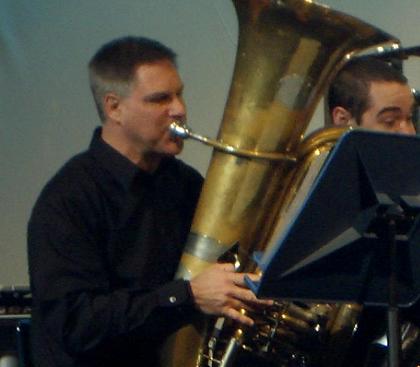
Pumping it out: BBCF take the tuba route
The next piece to be performed was ‘The Prayer', which featured some of the most controlled playing heard the entire day. Both duets (featuring cornet/euphonium and flugel/trombone) were wonderfully executed, and the band's control of dynamics was at times breathtaking. The MD's arrangement ‘Funiculi-Funicula Rhapsody', featuring the theme from the well known air-varie ‘Napoli', continued the programme, with the band yet again showing their excellent control across different tempos and styles. A real sense of purpose from the band came across right up to the closing notes. This was so enjoyable to listen to and watch, with all sections playing to their full potential.
The band ended their programme with, ‘Rolling Thunder'. The piece started excellently, and although there could have been slightly more clarity in the fast passages from the euphonium, baritones and trombones, polished cornets and excellent percussion ensured that the band's programme finished in the best way possible.
Throughout the programme the band showed what a class act they are, and UK bands should take note of this before Central Florida's trip across the Atlantic to compete in Brass in Concert in a few weeks time. By this stage of the competition Central Florida were well in front of the rest, and it looked like they had enough class to take the title at the end of the contest, even with four bands left to play.
After the interval, in which Illinois' finest cuisine (hot dogs and Pepsi) was sampled, local team Prairie Brass Band set about in their attempt to take the title. From the word go the band produced a sound, which had not been heard yet in the competition.
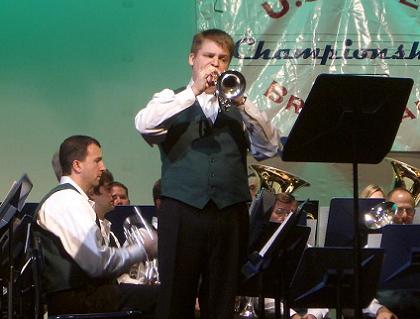
Eric Yates sings out Pandora with the Prairie Brass Band
Their first item ‘Introduction' showed a lovely, classic British brass band sound, and provided a bright start to the programme. Prairie's cornet soloist Eric Yates then stood to play ‘Pandora'. Everything in the solo was very well handled, with lovely shapes being created in the music. Added use of vibrato would have given some of the more lyrical passages that little bit extra class, but this effort was good enough to win the award for Best Cornet on the day.
Whit Friday staple ‘The Contestor' followed, and once again the band's sound really did impress. Balance, control and crisp semiquavers made this a treat to listen to, and the placing of the bass section on risers behind the band helped give the band extra balance, as previous bass sounds had tended to be swallowed up at the back of the stage. ‘You Are the Night and the Music' contained some great samba-style playing, and some of the best xylophone playing heard on the day. A couple of small lapses did not affect the band in any way, ensuring the playing remained at a high standard throughout.
Prairie finished with Philip Harper's wonderful arrangement of music from ‘Far and Away'. Unfortunately though the band seemed to be running out of steam a little by this point, and the piece never really seemed to get going or contain any of the excitement and nice sounds that that characterised the band's playing in previous items. It was a slightly disappointing end to a programme which had otherwise been extremely enjoyable throughout.
The band will go places in the next few years if they can build on the wonderful sound they utilised so well in this contest. There was enough class to challenge for the prizes, and it was a shame that little niggles here and there possibly cost points for this classy ensemble.
Glinka's overture to ‘Ruslan and Ludmilla' began Eastern Iowa Brass Band's contest programme. A very good start was spoiled by lack of pace and security in many of the running passages, and more dynamics could have been used to add extra musical interest to the playing. ‘You Raise Me Up'' then featured the band's cornet and flugel soloists, both of whom played with aplomb and created some lovely moments. The band's playing then upped a notch in the march ‘Goldcrest'. The bell effects all worked a treat, and the MD whipped everything along at a very well-chosen tempo.
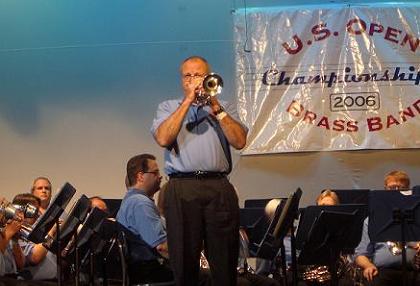
Pointing in the right direction: Eastern Iowa continue to improve
‘Putting On the Ritz' saw the band continuing to play with vigour, and the programme was getting better and better at this point. As was common with a few bands on the day, the band did occasionally show that they could produce a much bigger sound without any harshness. During this item this was sometimes used, but this sound potential could have been used a much more in general. ‘Xylophonia' was the band's ‘comedy' item, and was a great play on the famous Spike Jones. Unlike many entertainment contest pieces in which the comedy elements end up being rather embarrassing, the humour in this actually did make the audience genuinely laugh! The xylophone playing throughout was absolutely first-class as well.
Eastern Iowa chose ‘Riverdance' to end their programme. The cornet playing at the end was superbly relaxed, and the vibraphone's choice of dynamic was absolutely spot on. The first section had the potential to be stunning, but the choice to insert gaps between the phrases did not fit with the mood which the composer/arranger had in mind. The compound time section started at a very slow tempo which took away some of the excitement, but all solo lines were very solidly played indeed.
The tempo picked up in the latter sections of the piece, finally creating some real Irish flair. The band's soprano player also started to play to her potential, having played beautifully but subdued throughout out for many of the other pieces, and this was a joy to listen to. Possibly not enough to challenge some of the other bands, but Eastern Iowa did produce a performance that was well balanced and enjoyable to listen to, only spoiled by a number of stylistic errors. They can be pleased with their efforts though.
Fountain City Brass Band was the penultimate band of the day, and started off their programme with an arrangement of ‘The Land of Make Believe' by principal euphonium Lee Harrelson. This innovative piece of arranging was nicely played by the band, but was also one of the most surreal items in an entertainment contest that has probably ever been thought up. Percussionist Mai Tadokoro walked around the stage in a pair of pink pyjamas (which she had been wearing all day), in an almost trace-like state and was joined by the other band members at various points during the piece. Good enough stuff to win the award for Best New Arrangement, but one of the strangest things these reviewers have ever seen!
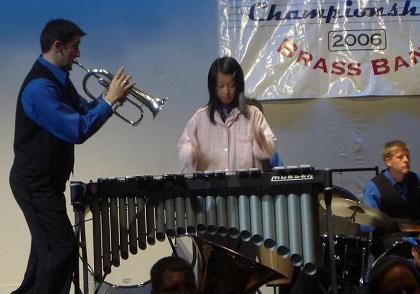
Make Believe: Flugel and Xylo combine for Fountain City
Fountain City's second euphonium player Nate Gay then took to the front of the stage to present the 3rd movement of the popular Cosma Euphonium Concerto. Any questions which people might have asked as to why the second and not the principal euphonium would have been playing a solo were immediately cast aside, as the Nate's playing was simply superb from start to finish. The many technical hurdles in the piece were overcome with consummate ease, and the performance simply exuded confidence from start to finish.
Therefore it was no great surprise when Nate was awarded the Best Soloist prize later on in the evening – no-one came close to touching him all day. William Himes' beautiful arrangement of ‘Amazing Grace' followed. This is one of those pieces which is always at risk of being overplayed by bands, but the performance Fountain City gave was at times breathtaking. From the wonderfully controlled cornet chorale to a well shaped ending, this oozed class from the word go, and was possibly the best band playing to be heard all day.
Next followed a romp through another much-played item, ‘Bugler's Holiday'. The band's cornets were always in control, with balance and clarity in the triple tonguing being the order of the day. There also were some very impressive xylophone passages (played by the now pyjama-less percussionist) which augmented the band's sound.
This only left the final item, and it proved to be a great finisher to an impressive programme. ‘March from Pines of Rome' started atmospherically, and the band created just the right sense of menace and foreboding in the opening sections before leading to a committed ending. Sometimes one could have wished for a bigger overall sound to make the louder passages more exciting, but this was the only complaint in which proved to be a fine close to the band's playing. At this stage 4BR had Fountain City a nose ahead of BBCF, with only one band still left to play.
The final band to take the stage was the Jaguar (Coventry) Band, whose performance had been the most eagerly anticipated one of the day by the audience. The band got off to a flying start with the popular ‘Hora Staccato' featuring the band's cornet section. Not often seen being used as a opener to a concert programme, the playing was top notch throughout, and it provided a cracking start to the band's shot at the title. 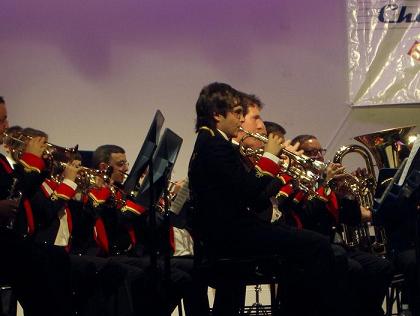
Traditional British values: Jaguar do it as they know best.
The next piece on the programme was the ‘New Colonial' march. One of the day's prizes was that for best march, and this performance easily took the title. Although the tempo was a little on the steady side, the band swaggered through the march from start to finish, showing lots of class and rhythmic quality. However, the sound of the ensemble did start to get a little harsh at the top end of the dynamic scale, something which possibly cost a few points.
Jaguar's flugel player Andrew Bates then gave a nice rendition of ‘I've Got You Under My Skin'. Both band and soloist seemed completely comfortable throughout, although possibly slight changes in style towards a more relaxed swing would have resulted in this performance gaining greater rewards from the adjudicators. But Andrew is a very fine flugel player indeed. ‘In Perfect Peace' was a wonderful choice for a slow piece in the programme. Much smooth, lyrical playing was in evidence here, but the band did not once get down to a real pianissimo which would have greatly increased the emotional impact on the audience.
The final (published!) item on the band's programme was the Finale from Tchaikovsky's Symphony No. 4. This had plenty of drive throughout its entirety, and in many parts the technique of the band impressed greatly. Some semiquaver passages did not sound entirely convincing however, and once again overblowing was in evidence in parts. It must be said that the band's soprano player came into his own here, having been excellent throughout the entire performance.
Just when everybody thought contest was over, the band suddenly launched into an upbeat rendition of the theme tune from ‘Hawaii 5-0'. This was something of a stroke of genius by the MD, as it whipped the audience up even more! The playing was all good, and there were some fine contributions, including a particularly impressive cornet break from Brighouse bumper-up Jamie Cooper.
Hawaii 5-0 rounded off a programme which had so much to admire in it, and one which brought the American audience to their feet at its conclusion. Possibly if a little more restraint had been used the band would have impressed even more. With the contest now over, would all Jaguar's effort be enough to take the 1st prize at the end of the day? 4BR had them a very close second to Fountain City, with Central Florida a whisker behind in 3rd.
After a contest's Gala Banquet, it was finally time to reveal the results. First up came the special awards, which comprised Most Entertaining Band, Best Performance of a March, Best New Arrangement, Best Soloist and Best Cornet Player. Fountain City won three of the four, with Nate Gay winning Best Soloist, Most Entertaining Band and Lee Harrelson winning Best New Arrangement for ‘Land of Make Believe'.
Prairie's cornetist Eric Yates won the Best Cornet award for ‘Pandora', and Jaguar (Coventry) easily won the award for best march for their performance of ‘The New Colonial'. So to the results, and Frank Renton announced that the second place trophy would be going to England with the Jaguar band. After only a short wait and the second place presentation, the audience were eager to hear which band would take the title of US Open Champions for 2006. It was no great surprise when Brass Band of Central Florida were announced as winners for this year, and a delighted Michael Garasi stepped up to receive the trophy and a cheque for $1000.
This year's US Open is a definite indicator that brass banding in the US is moving forward in leaps and bounds. With every band showing a marked improvement since last year's contest, things can only get better for a movement that is going from strength to strength at a remarkable pace.
Rob Richardson and Pat Herak




